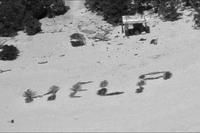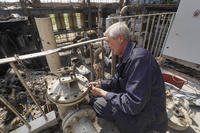NATO is desperately short of attack and transport helicopters that can support its International Security Assistance Force (ISAF) in Afghanistan, senior sources in NATO Headquarters say. In recent weeks, the alliance has been examining multiple options to correct the shortfall.
Proposals on the table range from improved training and logistic support for deployed helicopters, to a commonly funded modernization of 20-odd Russian-built, Czech-owned Mil Mi-8 Hip transport helos that could then be used to form a multinational transport pool for Afghanistan-type operations.
Representatives from several NATO nations will be discussing these options at a seminar in Brussels, a senior European diplomat in NATO Headquarters tells Aviation Week & Space Technology.
"I believe the U.S. will also shortly come forward with specific proposals to help solve this problem," he adds.
The helicopter shortage is the "single biggest operational problem" that is hampering the day-to-day operations of ISAF, a 41,000-strong multinational mission led by NATO and comprising troops from 38 nations, including 14 that are not members of the alliance.
"Were beseeching, begging, doing everything we can to convince nations to contribute more rotary-wing aviation assets, both transport helicopters and attack helicopters," a Canadian NATO official says.
"Its not that NATO nations dont have helicopters. The problem is that theyre very expensive to ship to Afghanistan and to operate and maintain them there. I think there are several nations that prefer to keep their helicopters at home for this reason."
At the Shephard Heli-Power conference in The Hague, operational commanders stressed that ISAF is struggling with a "constant imbalance of demand versus availability of both attack and transport helicopters."
"Without helicopters, operations in southern Afghanistan are not possible. Theres a lack of road infrastructure and a high threat of improvised explosive devices and ambushes by Taliban and other opposing militant forces," says Maj. Gen. Ton van Loon of the Royal Netherlands Army. He returned from Kandahar earlier this year after having commanded ISAFs Regional Command (RC) South.
Read more about NATO's helo woes from our Aviation Week partners at Military.com.
-- Christian








